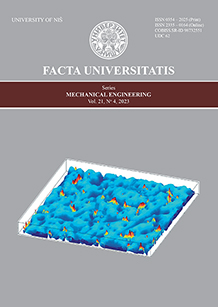CISPLATIN - AN OVERVIEW OF ITS EFFICIENCY AND TOXICITY
IF 11.8
2区 工程技术
Q1 ENGINEERING, MECHANICAL
引用次数: 0
Abstract
Cisplatin is the first heavy metal compound that has been found to possess antineoplastic activity. It is effective in treating testicular, ovarian, head and neck, bladder, cervical, esophageal tumors, and small cell lung carcinoma. Approximately 1% of cisplatin that enters the cell interacts with DNA, forming DNA-cisplatin bonds. Both apoptosis and necrosis can be found in the same population of cells exposed to cisplatin, and the mode of cell death depends on the cisplatin concentration and metabolic state of the target cell. In the bloodstream, the platinum component of cisplatin binds to the blood's proteins (hemoglobin, albumin and transferrin), and other significant portion binds to the glutathione and other cysteine-rich biomolecules. Cisplatin impairs the mitochondrial and cell antioxidant defense system (decreases GSH, NADPH levels, GCH/GSSG ratio, and increases GSSG levels) leading to oxidative stress. There are three main mechanisms of cell resistance to cisplatin: (1) enhanced repair of cisplatin-induced DNA lesions, (2) decrease in uptake and/or increase in efflux and (3) inactivation of cisplatin intracellularly. The usage of cisplatin is limited due to its toxicity and side effects, which include neurotoxicity (numbness and tingling, paresthesia, reduced deep tendon reflexes), nephrotoxicity (renal insufficiency, hypomagnesemia), ototoxicity (tinnitus and bilateral high-frequency hearing loss), cardiotoxicity (changes in electric heart activity, congestive heart failure), gastrotoxicity (nausea, vomiting, and dyspepsia), etc. So far, there has been no effective, clinically administered, therapy for cisplatin-induced toxicity.顺铂-其有效性和毒性的概述
顺铂是第一个被发现具有抗肿瘤活性的重金属化合物。对睾丸、卵巢、头颈部、膀胱、宫颈、食管癌、小细胞肺癌等肿瘤均有疗效。进入细胞的约1%的顺铂与DNA相互作用,形成DNA-顺铂键。在同一群暴露于顺铂的细胞中可以发现细胞凋亡和坏死,细胞死亡的方式取决于靶细胞的顺铂浓度和代谢状态。在血液中,顺铂的铂成分与血液中的蛋白质(血红蛋白、白蛋白和转铁蛋白)结合,其他重要部分与谷胱甘肽和其他富含半胱氨酸的生物分子结合。顺铂损害线粒体和细胞抗氧化防御系统(降低GSH、NADPH水平、GCH/GSSG比值,并增加GSSG水平),导致氧化应激。细胞对顺铂的耐药主要有三种机制:(1)顺铂诱导的DNA损伤的修复增强,(2)摄取减少和/或外排增加,(3)细胞内顺铂的失活。顺铂的毒性和副作用限制了其使用,包括神经毒性(麻木和刺痛、感觉异常、深肌腱反射减少)、肾毒性(肾功能不全、低镁血症)、耳毒性(耳鸣和双侧高频听力损失)、心脏毒性(心电活动改变、充血性心力衰竭)、胃毒性(恶心、呕吐、消化不良)等。到目前为止,临床上还没有针对顺铂引起的毒性的有效治疗方法。
本文章由计算机程序翻译,如有差异,请以英文原文为准。
求助全文
约1分钟内获得全文
求助全文
来源期刊

Facta Universitatis-Series Mechanical Engineering
ENGINEERING, MECHANICAL-
CiteScore
14.40
自引率
2.50%
发文量
12
审稿时长
6 weeks
期刊介绍:
Facta Universitatis, Series: Mechanical Engineering (FU Mech Eng) is an open-access, peer-reviewed international journal published by the University of Niš in the Republic of Serbia. It publishes high-quality, refereed papers three times a year, encompassing original theoretical and/or practice-oriented research as well as extended versions of previously published conference papers. The journal's scope covers the entire spectrum of Mechanical Engineering. Papers undergo rigorous peer review to ensure originality, relevance, and readability, maintaining high publication standards while offering a timely, comprehensive, and balanced review process.
 求助内容:
求助内容: 应助结果提醒方式:
应助结果提醒方式:


